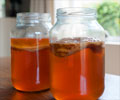Tea drinker or not, add flavonoid-rich foods to your diet to decrease the risk of heart disease and cognitive disorders.
- Tea contains a chemical compound called flavonoids that help in reducing the risk of heart diseases and disorders that can impair reasoning skills, thinking skills, and memory
- Flavonoids are packed with antioxidants and can be highly beneficial to the body//
- Flavonoid supplementation should be taken within the daily limits
Tea flavonoids and cardiovascular health
Go to source). There is a long history of tea being packed with health benefits, and this latest study by Edith Cowan University (ECU) shows that they may be even better for us than previously thought.
In this study, 881 elderly women (with a median age of 80) were included, and it was discovered that they were far less likely to have an extensive build-up of abdominal aortic calcification (AAC) if they consumed a high level of flavonoids in their diet.
AAC is the calcification found in the abdominal aorta, the largest artery in the body, which supplies oxygenated blood from the heart to the abdominal organs and lower limbs and is a predictor of cardiovascular risk such as heart attack and stroke (2✔ ✔Trusted Source
Higher Habitual Dietary Flavonoid Intake Associates With Less Extensive Abdominal Aortic Calcification in a Cohort of Older Women
Go to source).
The study also shed light on the findings that tea can reduce the risk of dementia in old-age.
Is Tea the Only Source of Flavonoids?
ECU Nutrition and Health Innovation Research Institute researcher and study lead Ben Parmenter said "while there were many dietary sources of flavonoids, some had particularly high amounts.""In most populations, a small group of foods and beverages—uniquely high in flavonoids—contribute the bulk of total dietary flavonoid intake," he said. “The main contributors are usually black or green tea, blueberries, strawberries, oranges, red wine, apples, raisins or grapes, and dark chocolate."
There are many different types of flavonoids, such as flavan-3-ols and flavanols, and all three are indicated to have a relationship with AAC.
Study participants who had a higher intake of total flavonoids, which is found in the diet of black tea drinkers, were 39 percent less likely to have extensive AAC.
It was also noted that participants who had two to six cups per day had a 42 percent lower chance of having extensive AAC when compared to the control group of non-tea drinkers.
However, some other dietary sources of flavonoids, such as fruit juice, red wine, and chocolate, did not show a significant beneficial association with AAC.
Though black tea was the main source of flavonoids in the study, likely due to the age of the participants, Mr. Parmenter said, "people could still benefit from flavonoids without putting the kettle on."
"Out of the women who don’t drink black tea, higher total non-tea flavonoid intake also appears to protect against extensive calcification of the arteries; this implies flavonoids from sources other than black tea may be protective against AAC when tea is not consumed."
Mr. Parmenter said this was important as it allows non-tea drinkers to still benefit from flavonoids in their diet. "In other populations or groups of people, such as young men or people from other countries, black tea might not be the main source of flavonoids, but AAC is a major predictor of vascular disease events, and this study shows that intake of flavonoids that could protect against AAC is easily achievable in most people’s diets," he said.
There are numerous studies that indicate a relationship between tea consumption and a reduced risk of heart attack and stroke; one such study also points to flavonoids’ ability to activate cellular insulin receptors, effectively blunting the harmful effects of diabetes.(3✔ ✔Trusted Source
Tea and cardiovascular disease
Go to source).
A Radical Approach of Flavonoids
One area of human health in which we can accurately determine the positive influence of flavonoids is the fight against free radicals. Many flavonoids are shown to have anti-oxidative activity, free radical scavenging capacity, heart disease prevention, anti-inflammatory, and anticancer activities, while some flavonoids exhibit potential for even antiviral activities (4✔ ✔Trusted SourceChemistry and biological activities of flavonoids: an overview
Go to source). This is one of the reasons why dietary flavonoids aid in the fight against Corona virus infection (5✔ ✔Trusted Source
Flavonoids are promising safe therapy against COVID-19
Go to source).
Practical Limitation of Flavonoid Supplementation
Some products promise to increase the flavonoid levels in the body by flooding it with ingredients such as green tea extracts. The main issue with such products is their trustworthiness, and they can act as potential toxins when consumed in excess (6✔ ✔Trusted SourcePotential toxicity of flavonoids and other dietary phenolics: significance for their chemopreventive and anticancer properties
Go to source).While there are many studies that look at the flavonoid advantages of tea, there are fewer that look at the effects of such extracts. A high concentration of green tea flavonoids may have a synergistic effect on the body. However, an excess of these flavonoids and other chemicals contained in such extracts may do more harm than good.
And, if you truly want to maximize the health advantages of a particular tea, consume it without any additives. There are no additional sweets or tastes, nor is there milk or creamer - just pure, pleasing tea.
But it’s important to remember that these are correlative and not causative links. There may be other aspects of the lives of normal tea drinkers that influence their improved cardiovascular scores, not least the increased water intake and attendant hydration that tea consumption gives, and tea includes important substances other than flavonoids.
References:
- Tea flavonoids and cardiovascular health - (https://pubmed.ncbi.nlm.nih.gov/20837049/)
- Higher Habitual Dietary Flavonoid Intake Associates With Less Extensive Abdominal Aortic Calcification in a Cohort of Older Women - (https://www.ahajournals.org/doi/10.1161/ATVBAHA.122.318408)
- Tea and cardiovascular disease - (https://pubmed.ncbi.nlm.nih.gov/21477653/)
- Chemistry and biological activities of flavonoids: an overview - (https://pubmed.ncbi.nlm.nih.gov/24470791/)
- Flavonoids are promising safe therapy against COVID-19 - (https://pubmed.ncbi.nlm.nih.gov/34054380/)
- Potential toxicity of flavonoids and other dietary phenolics: significance for their chemopreventive and anticancer properties - (https://pubmed.ncbi.nlm.nih.gov/15223063/)
Source-Medindia
















